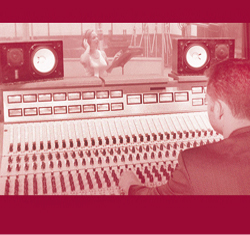
There will be caching schemes, I’m sure, and hopefully they will improve all the time as well. What lies ahead is exciting, and you can’t stay rooted in the past.
Another contributing factor to any perceived decline in quality is that budgets are shrinking, so people aren’t given adequate amounts of time to hone their sounds in a professional environment.
That’s true, and, as a producer, I find that very frustrating. These days, the budgets are so small that the only way you can make an album is to do it as quickly as you possibly can; otherwise somebody ends up not being paid.
As a result, there’s very little room for experimentation, so it’s very bad from an artistic point of view. And they’re cutting the budgets all the time— every day, there seems to be less and less available and more and more corners being cut.
Yet somehow you don’t ever hear about record company executives taking a cut in salary.
Still, I honestly don’t think it’s been economics that have been the sole downfall of record labels.
The problem is that, generally speaking, they have gotten themselves into an irreparable situation, and so they’ve become very adept at signing music that most people don’t want to listen to. That’s because most of today’s A&R people don’t come from a proper musical background.
They’re much more into trends rather than something being good. If something is on the front page of the newspapers, they want to sign it, and then all the other labels want to sign the same thing.
In fact, very often, labels sign artists just to stop other labels from getting them, not because they really believe in them. My daughter likes a lot of current music because she’s young, but she often asks me, “Why is it only old stuff that gets covered, or sampled?”
What do you think is the solution?
It’s a question of rejigging the model. The major labels still have huge overheads—huge offices in New York and LA, and big staffs to run.
But if you run a tighter ship and share the ownership of the product with the artist, if you don’t con them into thinking you’re going to be selling millions of records when you know you’re not, and if you keep the costs down, then the artist can make the same amount of money selling far fewer records.
That’s a model that a lot of people are starting to look into now.
Even in the old days, when a lot of records were being sold by people like Sting or Phil Collins, it was only because they were selling eight or nine million records that nobody was complaining.
The people associated with them were making good money—nowhere near the huge amounts of money the record labels were making, but good money—so you put up with it, just as you put up with the fact that you weren’t going to get paid anything from certain foreign territories because of bootlegging. You were just educated by the record labels into assuming this was normal.
